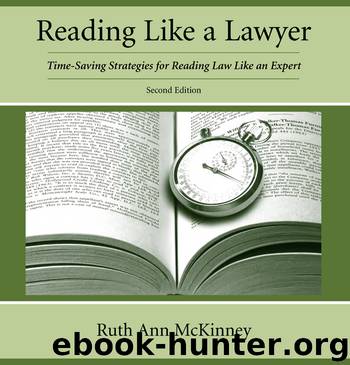Reading Like a Lawyer: Time-Saving Strategies for Reading Law Like an Expert, Second Edition by Ruth Ann McKinney

Author:Ruth Ann McKinney
Language: eng
Format: mobi
Publisher: Carolina Academic Press
Published: 2012-07-02T00:00:00+00:00
Chapter 10
Evaluate What You’re Reading –
Your Ideas Matter
Expert readers evaluate what they read. They don’t assume the author is an authority whose written contributions are beyond their reach. Rather, to “make meaning” of text, expert readers make judgments about the content of what they’re reading as they read, learning from the author but also forming opinions about the content, style, validity, and power of what they’re reading. Interestingly (but predictably), the less a reader knows about the subject of a text, the less inclined the reader is to evaluate the text.1 Also, if the reader assumes the text is merely transmitting objective information, the reader is less inclined to evaluate the text.2 The more a reader knows about a subject and the more the reader expects to glean from the reading, the more meaningful his or her engagement with the text becomes.
Like all expert readers, expert law readers engage heavily in evaluating the law they are reading. The more experienced the law reader, the more meaningful his or her thoughts about a case can be. Also, experienced law students know full well that opinions have not been included in their casebooks merely to transmit objective information to the reader – and that reading cases passively as if they were just about “information” would be inappropriate. If casebook authors wanted to transmit “black letter rules,”3 there would be much easier and more straightforward ways to do so. Experienced law students know that cases are included in casebooks to give law students the opportunity to do what lawyers do in the real world – wrestle with the validity of the conclusions the court has drawn, question the characterization of the facts the court has adopted, wonder if the rules of law as stated are supported by the authorities cited. Reading law without evaluating it would be the last thing an exceptional lawyer would do.
When you read cases in your casebook, you can begin to evaluate what you’re reading at four levels:
(1) Evaluate your thoughts and feelings about the reading before you actually start to read (as discussed in Chapter 8);
(2) Evaluate the judge’s writing style as you read;
(3) Evaluate the judge’s possible biases, assumptions, and perspectives;
(4) Evaluate the intellectual content of the reading.
(1) Evaluate Your Thoughts and Feelings
As you have learned throughout this book, exceptional reading requires you to interact actively with a text, not to simply open your mind and have information poured into it. Your prior knowledge in the area of law you’re reading about, your prior knowledge about the facts underlying a case you’re reading about, your prior assumptions about premises the court may be adopting, and your prior knowledge about the socioeconomic and historical realities that existed at the time and place of decision all influence what you can bring to your reading – and, hence, what you are able to take from your reading. The better you evaluate your prior knowledge (its accuracy, its influence on your ability to be open-minded, etc.), the more effective the results of your reading.
Download
This site does not store any files on its server. We only index and link to content provided by other sites. Please contact the content providers to delete copyright contents if any and email us, we'll remove relevant links or contents immediately.
| Annotations & Citations | Law School Guides |
| Legal Profession | Legal Writing |
| Test Preparation |
Master of the Game by Sidney Sheldon(2290)
GRE Premier 2017 with 6 Practice Tests by Kaplan(1861)
Law School Essays that Made a Difference by Princeton Review(1806)
Objection! by Nancy Grace(1784)
Law: A Very Short Introduction by Raymond Wacks(1747)
A Life of Crime by Harry Ognall(1729)
Philosophy of law a very short introduction by Raymond Wacks(1670)
Examples & Explanations: Administrative Law by William F. Funk & Richard H. Seamon(1646)
College Essays that Made a Difference by Princeton Review(1635)
Cracking the SAT Premium Edition with 6 Practice Tests, 2017 by Princeton Review(1591)
Writing to Win: The Legal Writer by Steven D. Stark(1590)
Civil Procedure (Aspen Casebooks) by Stephen C. Yeazell(1556)
GMAT For Dummies by Lisa Zimmer Hatch & Scott A. Hatch(1540)
Sidney Sheldon (1982) Master Of The Game by Sidney Sheldon(1520)
Drafting Contracts: How and Why Lawyers Do What They Do, Second Edition by Stark Tina L(1499)
Storytelling for Lawyers by Meyer Philip(1466)
So You Want to be a Lawyer by Lisa Fairchild Jones Esq(1417)
Graduate Admissions Essays, Fourth Edition: Write Your Way into the Graduate School of Your Choice by Donald Asher(1380)
Introduction to the study and practice of law in a nutshell by Kenney F. Hegland(1334)
